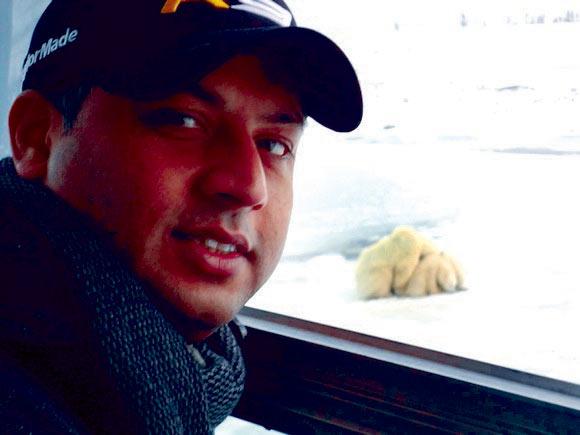 | « Back to article | Print this article |
The Arctic Challenge winner who wants to save the planet
Prashant Singh, Winner of the Arctic Challenge tells Ajit Jain about the expedition.
A few steps on ice -- a journey of a life time," said Chennai-based Prashant Singh, the leader of the Indian team that won a trip to the Arctic. The RSA, a property and casualty insurance company, with offices in over 34 countries, works in close association with the WWF and decided to take the winning teams to the Arctic to study the effects of climate change, explained Toronto-based company spokesperson, Julia Oosterman.
How did you succeed in winning the fundraising competition?
For the fundraising activity we chose to partner with WWF India's 'Save the Tiger' campaign. We raised $9,244 from over 250 generous contributors and also registered a total of 216 hours of volunteering work.
In the process of raising these funds we contacted over 2,000 individuals from all over the country creating awareness about the project. The fundraising was done through mobile contacts, our company (Royal Sundaram Insurance) colleagues, the electronic media, social networking sites, family and friends.
Besides going to the Arctic, with the company paying for all our expenses, including boots and winter clothing, air fare, hotels, food, etc., we were also awarded the Green Ambassadors title by the WWF India.
What was the experience like?
It was a once in a lifetime experience for us with all five team members walking together on an almost virgin land covered with a blanket of snow and seeing polar bears. It was truly a dream come true.
What was your reaction when you were told that your team had won?
It was a tough competition. Definitely winning the challenge out of the 23,000 RSA employees spread across the globe was an incredible experience. While working on the fundraising project we were not sure of the results. The news that we were the winners was shocking and, of course, it was a pleasant surprise.
Your thoughts when you boarded the Arctic-bound plane from Manitoba, Canada.
Our journey was almost 30 hours long, but we didn't suffer from jet lag, as we were so excited. We kept talking about polar bears, snow and the challenges in the Arctic. We were also preparing ourselves to step on snow for the first time in our lives.
You were in the Arctic for four days. What did you admire the most?
We made the most of our time there. Our activities included chopper rides, polar bear lifting, visiting the museum (Arctic Museum in Churchill, Manitoba), WWF team meetings and understanding the impact of climate change.
It was undoubtedly an amazing experience for us. There are many moments that I still cherish. Two of the most striking instances were when I saw the sun rise over the snow to mark a new beginning and a new learning experience, and the sight of a mother polar bear with her two cubs.
What have you learnt about the environment after this expedition?
The trip provided me a firsthand experience of observing the changing landscape of the Arctic. The melting ice due to global warming, the plight of polar bears and other wildlife have left a deep impression on my mind. I have been very fortunate to gain this experience, which transformed the way I think.
None of us think of the long-term effects of our actions that are adversely affecting the natural habitat of wildlife and ecosystems in other corners of the world. Everything is inter-linked and inter-dependent.
People may not know that a mother polar bear fasts while nursing her cubs. She does so to maintain fat-rich milk for her cubs. I infer a correlation from this example. Although it is natural for polar bears to do so, but, unless we preserve and prepare ourselves, sacrifice and take necessary actions today, we will only have stories left for our future generations.
I am back in Chennai now and ready to do my bit to conserve the environment from further destruction.
How do you sensitise your colleagues and friends in India about environmental issues?
We have been sharing details of our 'Save the Tiger Project' and the Arctic experience with our colleagues and friends.
Environmentally friendly behavior is now deeply ingrained in my team members and me. What do I do now? To start with I don't use plastic bags. I prefer walking over driving to the nearby stores. I switch off lights and all electronic equipments when they are not in actual use.
To mark India's 63rd Republic Day, January 26, I sent a packet of seeds to members of my business units for sowing at their place -- plants that will be a small step toward a green India and a green Earth.
